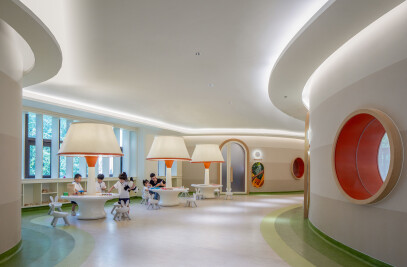Rounding out Kokaistudios’ recent Suhe MixC World in Shanghai which comprises a commercial space within a brand new green land, this mixed-use building contextualizes the project into its urban and green surroundings and elevates its presence in the city, all the while complementing and echoing neighboring architecture of the landmark tower.

Located in the northeast corner of multidimensional Suhe MixC World in Shanghai — an ‘urban valley’ comprising an underground commercial center set within in a brand new green land for the city — this mixed-use Commercial Podium in East Alley (hereinafter referred to as “side building”) acts a gateway to physically and aesthetically connect its wider site, revealing the underground commercial valley to the urban public space. A destination in its own right, the side building also draws on various elements of its surroundings including the linear design language of a neighboring landmark tower and green space to blur boundaries between architecture and nature, inside and out, public and private.

Housing offices, retail, and F&B outlets, as well as a massive equipment zone, the four-storey side building sits alongside 42-floor office tower by Fosters + Partners. To create visual consistency, Kokaistudios incorporated into the smaller building elements of its taller counterpart's form, as well as the verticality of the nearby commercial space by way of soaring pillars plus staircases that extend thorough the space. The building further connects to its surroundings through two distinct facades on its east and west side respectively.

Effectively a triptych of volumes, the Foster + Partner tower takes the form of two office buildings, connected by a vertical glass atrium in the middle. Echoing the form of its neighbor, Kokaistudios’ building comprises two four-floor structures either side of a glass-roofed void that extends horizontally through the space, and down to a basement level. Moreover, this symmetrical form echoes other ground-level buildings throughout the site - the axially symmetrical Thean Hou Temple and the fishbone texture of Shenyu Li, creating resonance among the architecture in this urban green land.

Further coherence with the adjacent tower is established by a fascia wrapping horizontally around the lower level side building. In light grey, the aluminum and glass structure resembles the materiality and color of the tower’s vertical lines, along with wrapping the equipment zone inside.

The side building also draws connections with its contrasting physical settings: on one side, the city and street; and on the other, the newly created green land. It achieves this through two distinct facades: the side of the building's primary entrance on Shanxi Bei Lu is sheer and contained, all the while revealing attractive views through the central void towards the green land beyond. On the green land-facing side, multi-level terraces lend an openness to the building, as well as F&B spaces in particular, integrating architecture with nature.

Inside, open and diametrically facing terraces overlook a central sunken void. On upper levels, F&B outlets are set back from terraces' edge to allow for attractive outdoor seating, while ceilings of wood make for a cozy atmosphere that connect to the green land beyond.

Accentuating vertical flow and connecting multiple levels is a staircase linking the basement and second floor levels. The second floor of north wing building is accessed from the green land side by way of large steps on the west side. With seating areas along the way, as well as a water feature running the stepped depth of the space, the large steps on the east side acting as the entrance to the underground commercial is both attractive and functional.

Further emphasizing the verticality of this newest side building and linking it to that of the main commercial space are two pillars extending from top to bottom. Here they support a canopy of roof glass that both echoes the materiality of the nearby office tower, and also floods the central space with natural light. Enhancing this effect, reflective louvers on the inside of the ceiling structure quite literally mirror visitor activity below, bringing the underground structure and ground-level greenery together with the city to interact in a theatrical way.

Both a destination in its own right, as well as a gateway to the broader site, the northeast building of Shanghai Suhe MixC World delivers multiple outcomes. Not only does it connect city to green land, it also complements its neighboring structures through materiality and form to create a diverse and multifunctional whole.

Team:
Design : Kokaistudios
Chief Architects: Andrea Destefanis, Filippo Gabbiani
Design Director: Li Wei
Design Team: Zhantao Qin, Eva Maria Paz Taibo, Yoko Zhang, Anna-Maria Austerweil, Wanli Xu
Photography: Terrence Zhang
Text: Frances Arnold
Media Contact: Jacqueline Chiang

























































